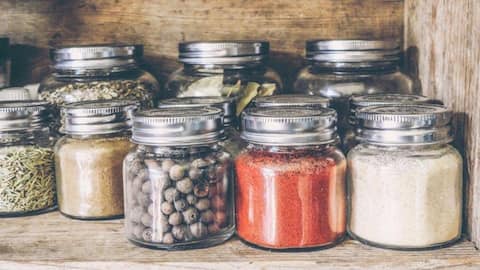Understanding the shelf life of spices
What's the story
Common spices and herbs like cloves, turmeric, rosemary, sage, and cinnamon boast potent antioxidant and anti-inflammatory qualities.
A well-stocked spice cabinet not only enhances flavor but also prevents spoilage and adds color to dishes.
However, if you've been gathering herbs and spices over time, you might find yourself wondering about their expiration dates and when it's appropriate to replenish them.
Ground vs whole
Storage and processing
The US Food and Drug Administration defines spices as aromatic vegetable substances, whether whole, broken, or ground, primarily used for seasoning purposes.
Spices originate from dried roots, bark, or stems, whereas herbs come from dried or fresh leaves.
The shelf life of dried herbs and spices depends on type, processing, and storage. Generally, whole or less processed seasonings last longer compared to ground ones.
Air exposure
Storage matters
When stored correctly, whole spices like peppercorns, cloves, mustard seeds, fennel seeds, etc. maintain their quality for up to four years, as their reduced surface area minimizes exposure to air, light, and moisture, preserving their aromatic oils and flavor compounds better than ground varieties.
Salt is an exception and remains usable indefinitely due to its primary composition of sodium chloride, which inhibits bacterial growth.
Role of aromatic oil
Preserving oils
Aromatic oils present in whole spices play a crucial role in extending their shelf life.
These oils contain volatile compounds that contribute to the spices' distinctive flavors and aromas.
When spices are ground, crushed, or processed, these oils are more exposed to air, light, and moisture, leading to oxidation and evaporation, which can degrade their quality over time.
Lose flavor
Spices don't expire
Dried herbs and spices typically don't expire or "go bad" in the traditional sense.
When a spice is considered to have gone bad, it means that it has lost much of its flavor, potency, and color.
It is usually safe to use dried herbs and spices past their best-by dates, but they might not be as flavorful as fresher ones.
Storage
Store in air-tight containers
To extend the shelf life of your herbs and spices and save money on replacements, it's essential to minimize their exposure to air, heat, light, and moisture.
Optimal storage involves placing them in a cool, dry, and dark location, such as a pantry or cupboard away from heat sources.
Use tightly sealed, non-porous containers like glass or ceramic, which are air and moisture proof.
Refrigeration
Keep away from heat sources
Stainless steel and tin containers offer viable storage options for spices as well, but it's crucial to keep them away from heat sources.
While refrigeration isn't necessary for most spices, red varieties like paprika and cayenne pepper maintain their color better when refrigerated.
Similarly, spices containing oil, such as sesame and poppy seeds, benefit from refrigeration to prevent rancidity.
Moisture
Prevent molding
Moisture provides an ideal environment for mold growth.
Mold spores are naturally present in the air, and when they land on moist spices, they can germinate and proliferate, leading to hard lumps causing spices to stick together.
Mold not only affects the appearance of spices but can also produce toxins that may be harmful if consumed. Therfore, discard any spices showing signs of mold.
